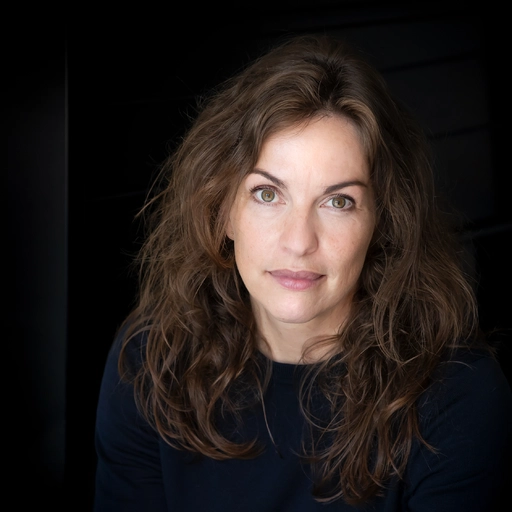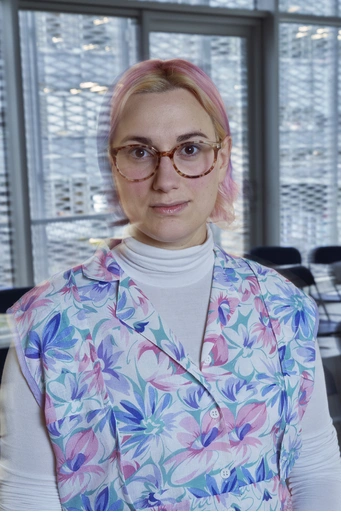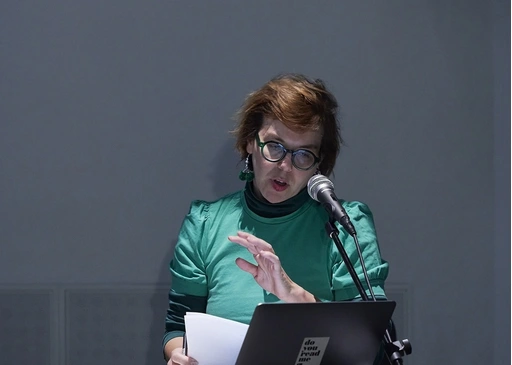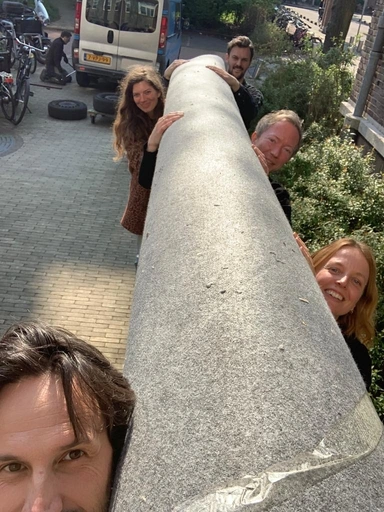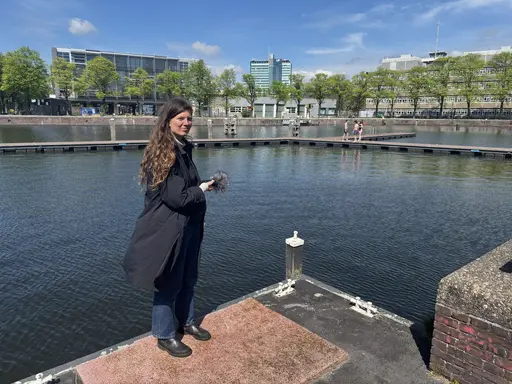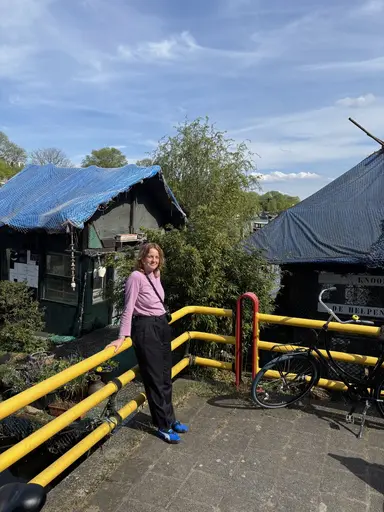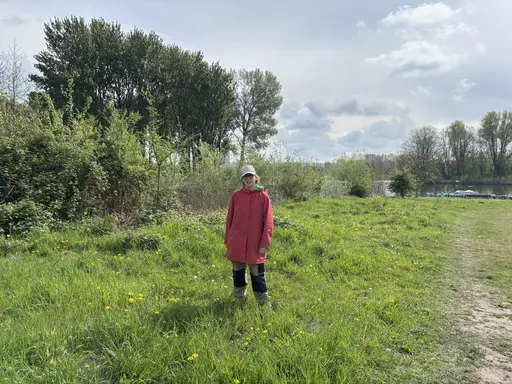With talks by Müge Yılmaz and Loom
On November 28, Müge Yılmaz gave her end of residency lecture and launched the first edition of the booklet series "Future Guide for the Salty Forager". Besides, we experienced a performative salt-resistant bite by the Brackish Collective. Katía Truijen and Radna Rumping from Loom, practice for cultural transformation, gave their start of residency lecture and introduced their research project "Rhine River Rehearsal – Reimagining a River." Take a look at the video and photos here.
Müge Yılmaz and S.A.L.T.
On November 28, artist Müge Yılmaz concluded her residency with the Climate Imaginaries at Sea Research Studio, sharing highlights from her residency and the results of her research titled S.A.L.T. During an inspiring presentation, she explored the impact of salinisation on soil, architecture, and ecology — issues stemming from rising sea levels.
An important part of Müge’s residency with the Climate Imaginaries at Sea Research Studio was her collaboration with Textile (TXT) and Architectural Design (AD) departments. Over the past year, Müge worked closely with students to investigate the realities of rising salinisation. This collaboration featured excursions to NIOZ, the Royal Netherlands Institute for Sea Research, and a salt farm on Texel Island. Here, students engaged with scientific and agricultural explorations, examining the effects of salinisation on soil, water, and future ecosystems through hands-on learning. These field trips culminated in Salaxis, a student exhibition at VOX-POP. The exhibition envisioned a speculative island shaped by salt, later developed and presented at Neverneverland as The Sixth Island — an extension of the five Wadden islands.
The conclusion of her residency also marked the launch of the inaugural edition of her Future Guide for the Salty Forager series. This booklet, the first in a speculative series. Set in 2124, this practical and imaginative foraging guide offers insights on gathering, living with, and consuming salty plants for future readers.
The event also marked a full-circle moment: Müge’s introduction lecture at the Rietveld Academie in October 2023 accompanied a workshop and tasting by Brackish Collective, making their return especially meaningful. Once again, Brackish provided a performative, salt-resistant bite, artistically linking saltwater and sweet water. This beautifully connected Müge’s research on sea water with the new residents of the Climate Imaginaries Research Studio, Loom and their research on the Rhine River.
Spotlight on Müge Yılmaz
Born in Istanbul and based in Amsterdam, Müge Yılmaz’s artistic practice is deeply influenced by feminist science fiction, offering new perspectives on our relationship with materials and environments. Her work often explores themes of protection, survival, and community themes, expressed through installations, performances, and photography.
At the heart of Müge’s residency is her generosity. She seized every opportunity to invite fellow artists, researchers, and students to engage in her inquiries, fostering inclusive and immersive spaces for shared exploration. Her research offers a vital perspective on the challenges and opportunities of rising sea levels, urging us to view salt not merely as a threat but as a transformative resource and material that could help reshape our relationships to land, agriculture, and the narratives they embody.
An important part of Müge’s residency with the Climate Imaginaries at Sea Research Studio was her collaboration with Textile (TXT) and Architectural Design (AD) departments. Over the past year, Müge worked closely with students to investigate the realities of rising salinisation. This collaboration featured excursions to NIOZ, the Royal Netherlands Institute for Sea Research, and a salt farm on Texel Island. Here, students engaged with scientific and agricultural explorations, examining the effects of salinisation on soil, water, and future ecosystems through hands-on learning. These field trips culminated in Salaxis, a student exhibition at VOX-POP. The exhibition envisioned a speculative island shaped by salt, later developed and presented at Neverneverland as The Sixth Island — an extension of the five Wadden islands.
The conclusion of her residency also marked the launch of the inaugural edition of her Future Guide for the Salty Forager series. This booklet, the first in a speculative series. Set in 2124, this practical and imaginative foraging guide offers insights on gathering, living with, and consuming salty plants for future readers.
The event also marked a full-circle moment: Müge’s introduction lecture at the Rietveld Academie in October 2023 accompanied a workshop and tasting by Brackish Collective, making their return especially meaningful. Once again, Brackish provided a performative, salt-resistant bite, artistically linking saltwater and sweet water. This beautifully connected Müge’s research on sea water with the new residents of the Climate Imaginaries Research Studio, Loom and their research on the Rhine River.
Spotlight on Müge Yılmaz
Born in Istanbul and based in Amsterdam, Müge Yılmaz’s artistic practice is deeply influenced by feminist science fiction, offering new perspectives on our relationship with materials and environments. Her work often explores themes of protection, survival, and community themes, expressed through installations, performances, and photography.
At the heart of Müge’s residency is her generosity. She seized every opportunity to invite fellow artists, researchers, and students to engage in her inquiries, fostering inclusive and immersive spaces for shared exploration. Her research offers a vital perspective on the challenges and opportunities of rising sea levels, urging us to view salt not merely as a threat but as a transformative resource and material that could help reshape our relationships to land, agriculture, and the narratives they embody.
Loom and the Rhine River Rehearsal
This academic year, the Climate Imaginaries at Sea research studio is pleased to welcome its new partner, Loom: Practice for Cultural Transformation. Rooted in dialogue, interdisciplinary exploration, and field recordings, Loom’s work resonates with the studio’s core mission. On November 28, Radna Rumping and Katía Truijen introduced their project, Rhine River Rehearsal – Reimagining a River. This artistic research initiative investigates the changing landscapes of the Rhine by collecting stories, samples, and voices.
Loom’s interdisciplinary approach addresses critical themes such as the land-water binary, the language of management and control in relation to water, and the myth of dry feet in Dutch planning for flood defence. In response, the project proposes alternatives like living with water, queering the river, and embracing wetness as a way of counteracting and counterthinking persisting notions of water.
The project challenges the rigid, human-imposed linearity of landscapes through embodied research, sonic activations, and elsewhere listening. It encourages us to perceive the Rhine as a dynamic and fluid entity.
We are particularly inspired by the innovative formats Loom introduces, including wetness walksand tours that engage participants with the sensory and material dimensions of watery landscapes. By weaving together five artistic methods for reimagining the river, Loom offers rich, layered insights into living with water in a time of increasing floods and high water.
Their Rhine River Rehearsal presentation marked a powerful starting point for what promises to be an exciting year of collaborative exploration with the Climate Imaginaries at Sea research studio. Stay tuned for upcoming events and developments as we collectively reimagine our future environments.
Loom’s interdisciplinary approach addresses critical themes such as the land-water binary, the language of management and control in relation to water, and the myth of dry feet in Dutch planning for flood defence. In response, the project proposes alternatives like living with water, queering the river, and embracing wetness as a way of counteracting and counterthinking persisting notions of water.
The project challenges the rigid, human-imposed linearity of landscapes through embodied research, sonic activations, and elsewhere listening. It encourages us to perceive the Rhine as a dynamic and fluid entity.
We are particularly inspired by the innovative formats Loom introduces, including wetness walksand tours that engage participants with the sensory and material dimensions of watery landscapes. By weaving together five artistic methods for reimagining the river, Loom offers rich, layered insights into living with water in a time of increasing floods and high water.
Their Rhine River Rehearsal presentation marked a powerful starting point for what promises to be an exciting year of collaborative exploration with the Climate Imaginaries at Sea research studio. Stay tuned for upcoming events and developments as we collectively reimagine our future environments.
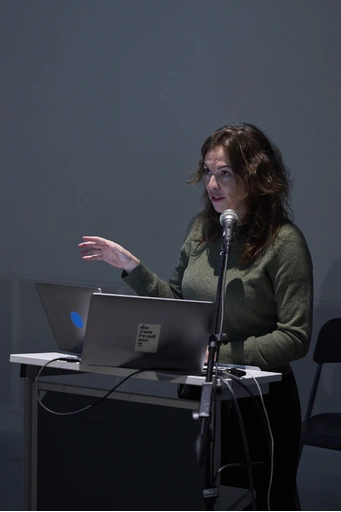
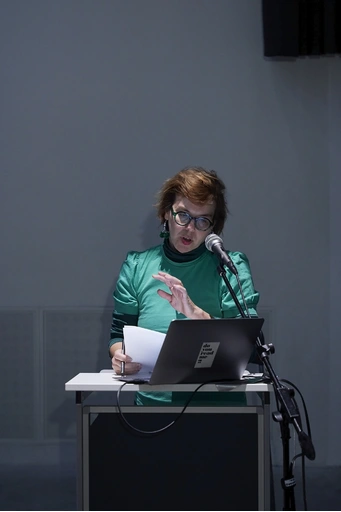
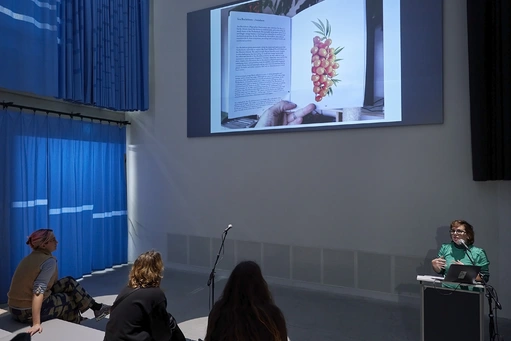
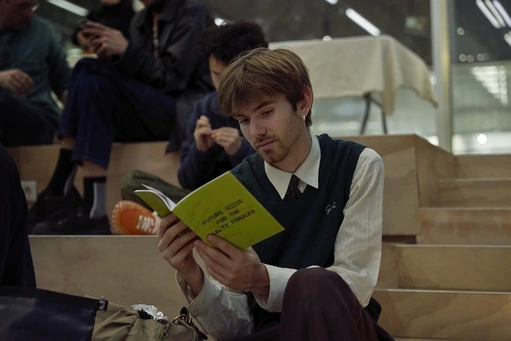
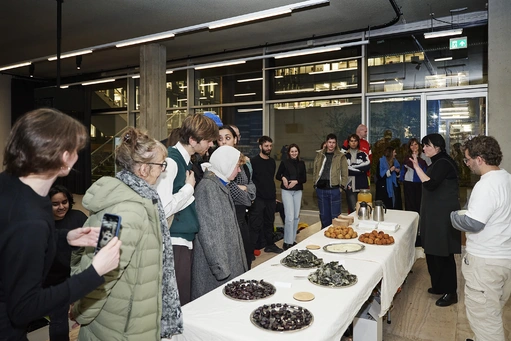
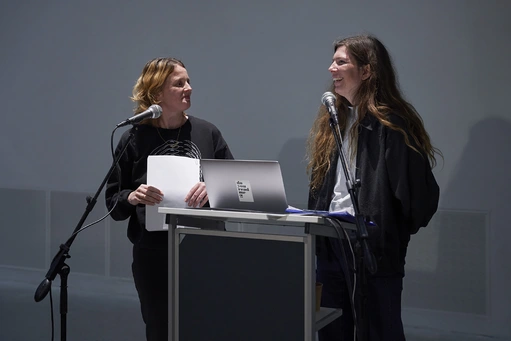
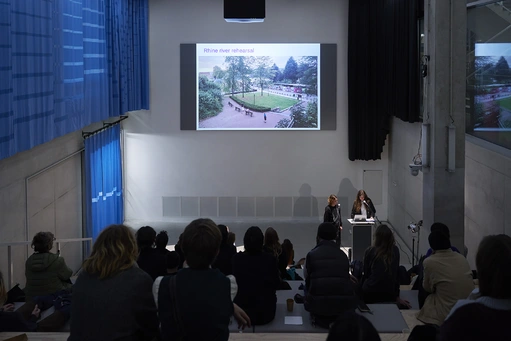
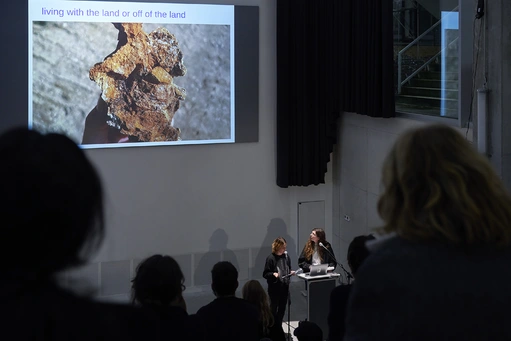
research group
Art & Spatial Praxis
Art & Spatial Praxis
project
Climate Imaginaries at Sea
Climate Imaginaries at Sea
